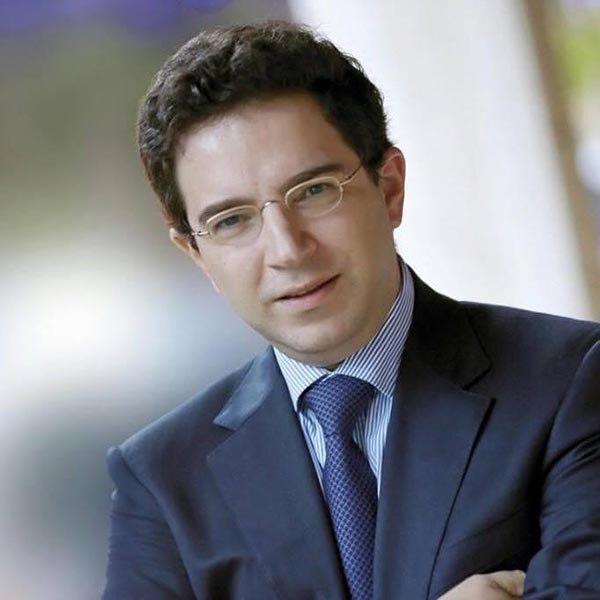Born in 1967 in Beirut, lawyer and writer Alexandre Najjar was awarded the ‘Grand Prix de la Francophonie’ by the French Academy. The award crowns the work of a Francophone individual who, in his country or internationally, has made an outstanding contribution to the maintenance and illustration of the French language”. Officer in the Order of Arts and Letters (France), Commander in the Spanish Civil Order, Officer in the Order of the Cedar, Alexandre Najjar is the author of some thirty books translated into twelve languages, including: Le Roman de Beyrouth, Phénicia, Berlin 36, Kadicha, LeSilence du ténor, Harry et Franz, Saint Jean-Baptiste, Mimosa, L’école de la guerre and Le Dictionnaire amoureux du Liban. He also directs the supplement « L’Orient littéraire » that he re-launched in 2006.
Excerpt from “The Astronomer”
“My master interrupted him:
-What is the point of developing the arts in an occupied country?
-A country does not die when it is occupied: it is when its culture disappears that it really dies!
He thought for a moment, then added in astern tone:
-In an occupied country it is worse than habituation. Habituation is when one takes the fold of the occupation; when the excesses of the occupier become acceptable by what one has become accustomed to; it is when one tells you: “Deir-el-Kamar has been ransacked” and you dream with nostalgia: “Deir-el-Kamar. How beautiful it was at sunrise!” Fatalism and regret never liberated a country!
“But you are one against thousand!” objected Galileo.
-Freedom is nourished by patience and hope. It is like water: it ends up rusting the sharpest blade and gnaws away at the strongest rock. It is sometimes necessary to sleep a long time and to dream without interruption that we are free, before waking up and discovering that freedom is there and that the dream has come true!
He remained silent for a moment, clapped his left hand on the table, then went on:
-You astronomer shave nothing to fear. Heaven is your kingdom. No one can take it from you, no one can remove you or banish you from this kingdom! Who can stop you from contemplating the firmament, from speaking to the stars, from wooing the moon?
-It is true”, admitted Gallileo. “We reign over heaven, and our kingdom is infinite”. Death itself can do nothing against us: instead of moving away from this kingdom, it brings us closer to it!”.

In French
Né en 1967 à Beyrouth, l'avocat et écrivain Alexandre Najjar a reçu le Grand Prix de la Francophonie décerné par l’Académie française. Ce prix couronne «l’œuvre d’une personne physique francophone qui, dans son pays ou à l’échelle internationale, aura contribué de façon éminente au maintien et à l’illustration de la langue française ». Officier dans l'Ordre des Arts et des Lettres (France), commandeur dans l'Ordre civil espagnol, officier dans l'Ordre du Cèdre, Alexandre Najjar est l’auteur d'une trentaine de livres traduits dans douze langues, dont : Le Roman de Beyrouth, Phénicia, Berlin 36, Kadicha, Le Silence du ténor, Harry et Franz, Saint Jean-Baptiste, Mimosa, L'école de la guerre et Le Dictionnaire amoureux du Liban. Il dirige aussi le supplément "L'Orient littéraire" qu'il a relancé en 2006.
Extrait de "L'Astronome"
"Mon Maître l'interrompit:
- A quoi bon développer les arts dans un pays occupé?
- Un pays ne meurt pas quand il est occupé: c'est quand sa culture disparaît qu'il meurt vraiment!
Il réfléchit un moment, puis ajouta d'un ton sévère:
- Dans un pays occupé, il n'est pire que l'accoutumance. L'accoutumance, c'est quand on prend le pli de l'occupation; quand les débordements de l'occupant deviennent acceptables par ce qu'on en a pris l'habitude; c'est quand on te dit: "Deir-el-Kamar a été saccagée" et que tu songes avec nostalgie: "Tiens, Deir-el-Kamar. Qu'elle était belle au lever du jour!" Le fatalisme et le regrets n'ont jamais libéré un pays!
- Mais vous êtes à un contre mille! objecta Galilée.
- La liberté se nourrit de patience et d'espoir. Elle est comme l'eau: elle finit par rouiller la lame la plus aiguisée et ronge le rocher le plus résistant. Il faut quelquefois dormir longtemps et rêver sans discontinuer qu'on est libre, avant de se réveiller et de découvrir que la liberté est là et que le rêve s'est réalisé!
Il se tut un moment, pianota de la main gauche sur la table, puis reprit:
- Vous autres, astronomes, vous n'avez rien à craindre. Le ciel est votre royaume. Nul ne peut vous l'arracher, nul ne peut vous destituer ou vous bannir de ce royaume! Qui peut vous empêcher de contempler le firmament, de parler aux étoiles, de courtiser la lune?
- C'est vrai, admit Galilée. Nous régnons sur le ciel, et notre royaume est infini. La Mort elle-même ne peut rien contre nous: au lieu de nous éloigner de ce royaume, elle nous en rapproche davantage ! "